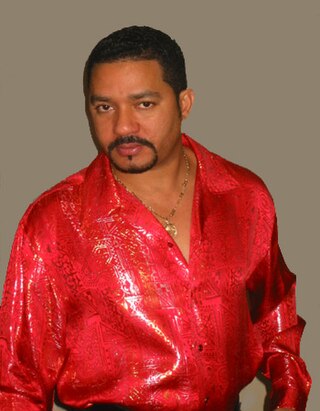
Juan Luis Guerra Seijas is a Dominican musician, singer, composer, and record producer. Throughout his career, he has won numerous awards including 28 Latin Grammy Awards, three Grammy Awards, and one Latin Billboard Music Award. He won 3 Latin Grammy Awards in 2010, including Album of the Year. In 2012, he won the Latin Grammy Award for Producer of the Year. He has sold 15 million records worldwide, making him one of the best-selling Latin music artists.

Mexican cinema dates to the late nineteenth century during the rule of President Porfirio Díaz. Seeing a demonstration of short films in 1896, Díaz immediately saw the importance of documenting his presidency in order to present an ideal image of it. With the outbreak of the Mexican Revolution in 1910, Mexican and foreign makers of silent films seized the opportunity to document its leaders and events. From 1915 onward, Mexican cinema focused on narrative film.
Latin American cinema refers collectively to the film output and film industries of Latin America. Latin American film is both rich and diverse, but the main centers of production have been Argentina, Brazil and Mexico. Latin American cinema flourished after the introduction of sound, which added a linguistic barrier to the export of Hollywood film south of the border.
Ramón Orlando Valoy García, is a Dominican musician, singer, arranger, composer, record producer and songwriter, besides being a gran maestro pianist in Caribbean rhythms. Ramón Orlando received seven Casandra awards in the 1992 ceremony, including the Soberano, which is the most important category in the Dominican awards ceremony. In 2005, he was nominated for the Latin Grammy Award in the Best Merengue Album category.

Nuevo Cine Mexicano, also referred to as New Mexican Cinema is a Mexican film movement started in the early 1990s. Filmmakers, critics, and scholars consider Nuevo Cine Mexicano a "rebirth" of Mexican cinema because of the production of higher-quality films. This rebirth led to high international praise as well as box-office success, unseen since the golden age of Mexican cinema of the 1930s to 1960s. The quality of Mexican films suffered in the decades following the golden age due in part to Mexican audiences watching more overseas films, especially Hollywood productions. This resulted in the rise of Mexican genres such as Luchador films, sexicomedias and ultimately the low-budget direct-to-video Mexploitation film.

Frank Reyes is a Dominican singer. Known as the Prince of Bachata, he is regarded as one of the best known bachata artists of all time and famous throughout Latin America. He is a 7 time Bachata Artist of the Year winner at the Soberano Awards, making him the most awarded artist in that category. He is known for hits like "Vine a Decirte Adios", "Con el Amor No Se Juega", "Tu Eres Ajena", "Nada De Nada", "Quién Eres Tu", "Princesa", "Amor a Distancia", "Decidí", among others.

The Soberano Awards are the Dominican music awards, which are awarded annually by the Asociación de Cronistas de Arte of the Dominican Republic in Santo Domingo. Often referenced in music line-ups to delineate a musician's popularity in Hispanic countries. Notable winners include Mozart La Para, Bad Bunny, El Alfa, Prince Royce, La Insuperable, and Don Omar. It airs annually in the spring on Telemicro in the Dominican Republic.

Chilean cinema refers to all films produced in Chile or made by Chileans. It had its origins at the start of the 20th century with the first Chilean film screening in 1902 and the first Chilean feature film appearing in 1910. The oldest surviving feature is El Húsar de la Muerte (1925), and the last silent film was Patrullas de Avanzada (1931). The Chilean film industry struggled in the late 1940s and in the 1950s, despite some box-office successes such as El Diamante de Maharajá. The 1960s saw the development of the "New Chilean Cinema", with films like Three Sad Tigers (1968), Jackal of Nahueltoro (1969) and Valparaíso mi amor (1969). After the 1973 military coup, film production was low, with many filmmakers working in exile. It increased after the end of the Pinochet regime in 1989, with occasional critical and/or popular successes such as Johnny cien pesos (1993), Historias de Fútbol (1997) and Gringuito (1998).
Isabelle Valdéz Santana, better known as Isabelle, is a Dominican singer of Christian music. She is the Christian music singer with the highest number of nominations for the Soberano Awards : 2007, 2010, 2011, 2013, 2015, 2018, 2019, 2020 and 2021, being the winner in the 2021 edition as "Singer of Christian music".
La Silla Awards are the awards granted by the Asociación Dominicana de Profesionales de la Industria del Cine (ADOCINE).

Nicolás Javier López Fernández is a Chilean film director, screenwriter and producer. He is known for comedies such as Promedio Rojo (2004), the Qué pena trilogy (2010–2012), and the Paz Bascuñán vehicles Sin filtro (2016) and No estoy loca (2018).

Chameleon is a 2016 Chilean psychological thriller film written and directed by Jorge Riquelme Serrano. It had its world premiere at the 2016 BFI London Film Festival where it was selected to compete for the Sutherland Award.
The Havana Film Festival New York (HFFNY) is a film festival, based in New York City, that screens cinema from across Latin America with a special focus on Cuba and its film industry. It is a project of The American Friends of the Ludwig Foundation of Cuba, a 501(c)(3) tax-exempt organization with the mission of building cultural bridges between the United States and Cuba through arts projects.
Germana Quintana is a Venezuelan-born theatrical and television director and producer, a pioneer of independent and musical theater in the Dominican Republic, where she is known as la señora teatro. She is the founder of several theater groups in Spain and Latin America.

Manuel Varet Marte, known as Vakero, is a Dominican singer and rapper, believed to be one of the most important acts of the Dominican urban music movement and one of the first to gain international exposure. Known for blending elements of punta, cumbia and merengue with Dominican urban and dembow music, he is heavily influenced by reggae and afro-pop with his characteristic style influenced by the rastafari movement.

Linar Espinal, better known as El Chaval de la Bachata, is a Dominican musician, singer, composer and producer.

Juan Carlos Valdivia is a Bolivian-Mexican director, producer, screenwriter, and actor. He is recognized for his contributions to Latin American cinema, having directed and produced numerous films and television programs throughout his career.










